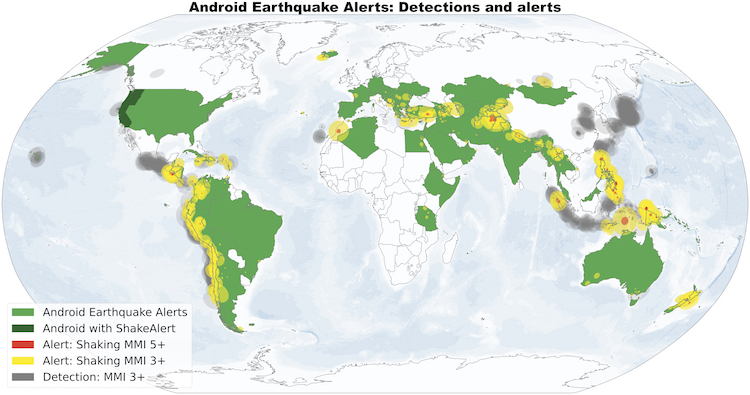Science
Android Phones Transform Earthquake Alerts with Early Warnings

The global network of Android smartphones has been harnessed to create an effective early warning system for earthquakes, potentially providing users with critical seconds to respond before shaking begins. This innovative approach, detailed in a comprehensive study by researchers at Google, involved millions of devices across 98 countries over a span of three years.
According to Richard Allen, a visiting faculty researcher at Google and director of the Berkeley Seismological Laboratory at the University of California, Berkeley, the Android Earthquake Alert (AEA) system could be especially beneficial in regions lacking established early warning frameworks. He stated, “By using Android smartphones, which account for approximately 70% of smartphones globally, this system can help provide life-saving warnings in many parts of the world.”
Traditional earthquake detection systems typically rely on networks of specialized seismic sensors. These systems, first implemented in countries like Mexico and Japan, have since been adopted in various nations including South Korea, Israel, and Canada. They function by rapidly identifying seismic activity near the epicenter and issuing alerts throughout the affected areas. Even a brief warning period can enable individuals to take protective measures, such as the recommended “drop, cover and hold on” (DCHO) protocol.
Establishing such seismic networks is often cost-prohibitive, leaving many earthquake-prone regions without adequate resources. However, the widespread availability of smartphones presents a unique opportunity. Most smartphones are equipped with accelerometers, and as their usage surged in the 2010s, scientists began investigating their potential for earthquake detection. Allen noted that while smartphone accelerometers are less sensitive than traditional seismic instruments, they can still register significant tremors during strong earthquakes.
Enhancing Earthquake Detection Through Technology
By the late 2010s, a number of research teams had developed mobile applications capable of sensing earthquakes, with early instances like Mexico’s SkyAlert and Berkeley’s ShakeAlert. The recent study advances this technology further. Allen explained, “By using accelerometers in a network of smartphones like a seismic array, we are now able to provide warnings in some parts of the world where they didn’t exist before and are most needed.”
Working alongside co-leader Marc Stogaitis, a principal software engineer at Google, Allen and their team tested the AEA system from 2021 to 2024. During this period, the app detected an impressive average of 312 earthquakes each month, with magnitudes ranging from 1.9 to 7.8, including significant events in Japan and Türkije.
For earthquakes measuring 4.5 or higher, the system dispatched “TakeAction” alerts to users. These notifications aim to capture attention promptly and encourage individuals to take protective actions, such as DCHO. Over the study period, the system issued an average of 60 “TakeAction” alerts per month, resulting in around 18 million individual alerts monthly. Lesser “BeAware” alerts were also sent to regions anticipated to experience shaking intensities of 3 or 4.
To evaluate the effectiveness of these alerts, researchers utilized Google Search to gather feedback through user surveys. From February 5, 2023, to April 30, 2024, a remarkable 1,555,006 individuals responded after receiving alerts from the AEA system. The results revealed that 85% of respondents experienced shaking, with 36% noting they received the alert before any ground movement occurred.
How It Works: The AEA System
The AEA system operates on principles similar to those of traditional earthquake detection methods. When a stationary Android smartphone detects a sudden increase in acceleration, indicative of seismic waves, it transmits this data to Google servers along with its approximate location. The servers then analyze the information to identify potential seismic sources that align with the detected patterns.
Stogaitis elaborated, “When a candidate earthquake source satisfies the observed data with a high enough confidence, an earthquake is declared and its magnitude, hypocenter, and origin time are estimated based on the P and S waves.” This detection capability is integrated into Google Play Services, making it available by default on most Android devices. With billions of Android smartphones in circulation, the AEA system can offer earthquake detection capabilities worldwide, regardless of the region’s economic status.
Looking to the future, Allen and his team aspire to expand the system’s functionalities to create additional hazard-reducing tools, such as ground shaking maps to aid emergency responses post-earthquake. For now, their focus remains on refining the AEA system. As Allen stated, “We are learning from earthquakes as they occur around the globe, and the Android Earthquake Alerts system is helping to collect information about these natural disasters at a rapid rate. We believe we can continue to enhance both the quality of earthquake detections and our strategies for delivering effective alerts.”
The findings of this study were published in the journal Science, highlighting an innovative approach that leverages existing technology to improve safety measures in earthquake-prone areas worldwide.
-

 Health3 months ago
Health3 months agoNeurologist Warns Excessive Use of Supplements Can Harm Brain
-

 Health3 months ago
Health3 months agoFiona Phillips’ Husband Shares Heartfelt Update on Her Alzheimer’s Journey
-

 Science2 months ago
Science2 months agoBrian Cox Addresses Claims of Alien Probe in 3I/ATLAS Discovery
-

 Science2 months ago
Science2 months agoNASA Investigates Unusual Comet 3I/ATLAS; New Findings Emerge
-

 Science1 month ago
Science1 month agoScientists Examine 3I/ATLAS: Alien Artifact or Cosmic Oddity?
-

 Entertainment5 months ago
Entertainment5 months agoKerry Katona Discusses Future Baby Plans and Brian McFadden’s Wedding
-

 Science1 month ago
Science1 month agoNASA Investigates Speedy Object 3I/ATLAS, Sparking Speculation
-

 Entertainment4 months ago
Entertainment4 months agoEmmerdale Faces Tension as Dylan and April’s Lives Hang in the Balance
-

 World3 months ago
World3 months agoCole Palmer’s Cryptic Message to Kobbie Mainoo Following Loan Talks
-

 Science1 month ago
Science1 month agoNASA Scientists Explore Origins of 3I/ATLAS, a Fast-Moving Visitor
-

 Entertainment2 months ago
Entertainment2 months agoLewis Cope Addresses Accusations of Dance Training Advantage
-

 Entertainment3 months ago
Entertainment3 months agoMajor Cast Changes at Coronation Street: Exits and Returns in 2025









